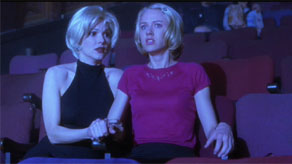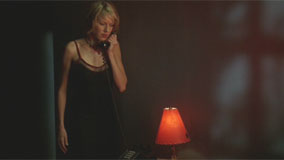|
Very few films have grabbed my attention in recent years quite as strongly as David Lynch's Mulholland Drive. A film that refuses to surrender to mere casual scrutiny, this is the rare pic that brazenly dares to challenge the viewer's preconceptions regarding such things as linear narrative, literal narrative, and flat out making any damn sense. Indeed, its challenge is often met by a swift throwing-in of the proverbial towel by many who concede a speedy victory to the film's desire to not be comprehensible. To much of the American public, this sort of delighting in obfuscation is downright annoying to the tune of an assfull of scotch bonnet peppers. But to those of us who are rather tired of seeing a movie's progression down well-worn roads coming from nine miles away, it's rather engaging.  Discussing what actually happens in the film seems almost without point: there's an amnesia victim, a girl with dreams of stardom, mob conspiracies, bungling hit men, mysterious deaths; in other words, the stuff movies have always been made of. There's also transplanted identities, untelegraphed flashbacks, a mysterious blue box that'll suck you up like a black hole, spookily lit telephones, and a freaky guy living behind a fast food joint that'll scare the bejeepers out of you on first viewing. Content is secondary to presentation of said content. With Mulholland Drive, Lynch proves once again just who's the master of taking normality and adjusting it ever so slightly until it looks unrecognizable. The genesis of the film is somewhat perplexing. Lynch had originally produced it as a pilot* for ABC, at ABC's request no less, only for the network to balk at the finished product and refuse to show it at all. "Too weird," they said. 'Too weird?' Was Lynch wearing a wig and calling himself Fred Smith during the negotiations? What were these retards expecting? The apparently deliberate hiring of three-time International Guy-Who-Directs-Weird-Shit-Award winner David Lynch notwithstanding, the fact remains that the initial pilot was comprised of what would end up being the most straightforward parts of the film. But for a few digressions, the story comprising the first 110 minutes of this two-and-a-half-hour flick is moody and eerie, but hardly a screwdriver in the brain. I, for one, would've found time in my schedule to watch a show with this for a pilot, and I don't even watch TV. Fortunately, Lynch was able to re-acquire the property from ABC, and reteaming with cast and crew a year later, he proceeded to revamp the plot into a stand-alone story. It's a bit of a double-edged sword in a way; we get a great movie, but can't help wondering where his original vision would've taken us.  The fact is, the plot is comprehensible if you pay attention. The cards are all placed on the table, but no one comes forth to tell you what picture they're supposed to make. There are, naturally, variations on theories galore debating what really happens, though I tend to subscribe to the Occam's Razor approach, that being that the simplest explanation that still covers everything is the most likely to be correct. One of the pratfalls of interpreting a story rife with symbolism is to assume symbolic meaning for everything when it's rather likely that there's a damn good amount of stuff that was only ever meant to represent itself. Much of the details aren't necessarily there to be literal, or even to impart clues, but simply to wring raw emotion from the audience. Light and sound play a big part in evoking the sense of wonder and mystery, with Angelo Badalamenti's sober and portentous score drawing out the dread, the sadness, and the myriad of emotional vectors that music addresses far better than vocabulary. As I once heard said regarding Angel's Egg, this is a film to be not so much seen as experienced. I'm not going to demand that you like the movie. It's going to be too obtuse for some, downright pointless for others. But those like me will find it a thrill ride of another sort, one that doesn't need a slow-mo shot of a muscular guy running in front of an explosion in order to excite. As Ian MacKaye would say, "flex your head!" And kudos simply must go to Naomi Watts for turning in one of the finest bits of character acting I've ever seen. If her screen counterpart had been so accomplished, the whole nasty business might've been averted. -review by Matt Murray *The original pilot screenplay can be found here.
|
|
||||||||